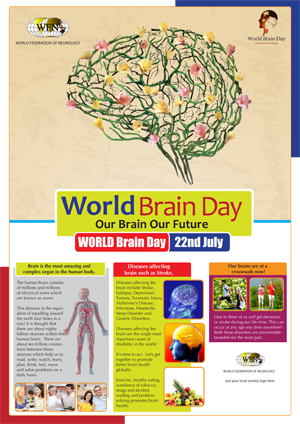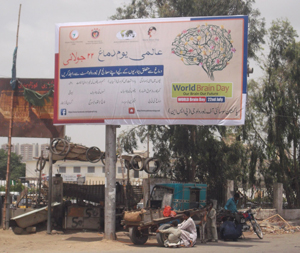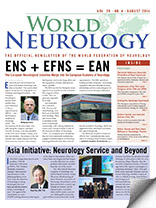PRESIDENT’S COLUMN

Raad Shakir
Many important events shape our future, and in the neurology world, one of those has happened since the last issue of World Neurology. The WFN has six regions across the world and one of them is Europe. For historical reasons, two neurological societies were created in the continent, and through the diligent work of many people, the EFNS and the ENS have now joined together to create the European Academy of Neurology (EAN). This occurred through good will and compromise on both sides. The newly established organization has inherited the work and funds of the two previous ones. This puts it in an excellent position to hit the ground running.
This amalgamation would not have been possible were it not for the farsighted view taken by the leaders of the EFNS and ENS, Prof. Richard Hughes, EFNS president, and Prof. Claudio Bassetti, ENS president. The new constitution would not have been possible without the hard work of the transitional team: Prof. Jacques De Reuck and Prof. Gustave Moonen from Belgium; Jose Ferro, Portugal; Detlef Kömpf, Germany; and Gunhild Waldemar, Denmark.
I might add that, in a way, history repeats itself as the WFN itself was created in 1957 by the initial efforts of three Belgians: our first President, Ludo Van Bogaert; Charles Poser, our first editor of World Neurology and Armand Lowenthal. The two Belgian members of the EAN’s transitional team have again been instrumental in creating a new and rather ingenious constitution for the new European Academy. This is a unique structure that serves to instruct us all on how to overcome differences and create functional and egalitarian professional organizations.

Figure 1. Raad Shakir and Günther Deuschl.
It was my pleasure to attend the first general assembly and elections held June 3, 2014, in Istanbul. Prof. Günther Deuschl from Kiel, Germany, was elected president. (See picture at right.) The EAN is now the single organization that unites and supports all neurologists across Europe. Currently, 45 European national societies as well as 800 individual registered members constitute the assembly. The EAN represents 19,000 European neurologists.
The next regional organization, which is due to be formally created, is the Pan American Federation of Neurological Societies (PAFNS) representing the WFN Latin America region. The constitution and bylaws have been approved, and it is expected that the organization shall be incorporated during the next WFN Council of Delegates meeting on Sept. 11, 2014, in Boston. The forthcoming World Congress in Santiago, Chile, is the most appropriate place for PAFNS to do all of its future planning and activities across Latin America.
By the time this issue of World Neurology is published, the first World Brain Day will have happened in July 2014. (See program cover on this page.) This date was chosen as it is the date of the creation of the WFN in 1957. Prof. Mohamed Wasay, chairman of the Public Awareness and Advocacy Committee, has worked tirelessly with the close collaboration of Prof. Wolfgang Grisold, secretary-treasurer general, to make this first day a success across the world. The emphasis is on celebrating the brain and its wonders and informing the public of our activities as well as inviting anyone who is interested in participating in them. The plan is to build on this first experience for the future and create new and novel activities in years to come.

Figure 2. World Brain Day logo.
These events can only happen as the WFN has a rich history, and many of our activities have their roots going back decades. Prof. Johan Aarli’s book, “The History of the World Federation of Neurology, The First 50 Years,” was published June 2014, and launched during the joint EFNS/ENS Congress in Istanbul. This is an excellent effort from our past president, and a review by Prof. François Boller is published in this issue of World Neurology.
Many of our committees met in Istanbul. The Publications and Communications Committee now incorporates the website, and Prof. Christopher Kennard, U.K., as chair of the committee, held its first meeting with many issues discussed regarding the future of the WFN contract with Elsevier. The website has changed dramatically, and the configuration is now more responsive and will be updated regularly.
The WFN finances continue to grow and allow the organization to increase its grants and activities. The Finance Committee under the chairmanship of Prof. Eduard Auff, Austria, reviewed the 2013 finances including the WFN investments. The conclusion is that the WFN is in good financial shape and the trustees, on behalf of all member societies, want to register their gratitude to the Austrian society and the EFNS for partnering with the WFN in the Vienna Congress, which was a great scientific and financial success.
The grants applications have been received, and the reviewers will produce their final decisions by the end of the summer. Again, the WFN is partnering with speciality and regional organizations. This has proven to be an excellent way to have global involvement in neurology research. The administration and monitoring of the grants is an integral part of the WFN secretariat, and this is performed most successfully.
The recent meeting of members of the World Brain Alliance was most rewarding, and members of peer organizations have all agreed on close collaboration at various levels to promote our activities at the highest levels, especially at the WHO and the United Nations. The noncommunicable diseases project is crucial for brain health. The aim is to promote awareness and support for brain-related disorders with their massive consequences leading to death and disability.

A billboard for World Brain Day 2014 in Karachi, Pakistan. Submitted by Mohammad Wasay, Aka Khan University.
The WFN has to have an annual Council of Delegates (COD) meeting to fulfill the requirements of being a U.K.-based charity. This year’s meeting will be held during the joint ACTRIMS/ECTRIMS meeting in Boston. The COD will meet at 9 a.m. on Sept. 11, 2014. The delegates will have the opportunity to hear all about our activities during the year and elect a new trustee to replace Prof. Gustavo Roman whose second term comes to an end. Roman has been involved in various activities of the WFN for many years. His contributions have moved the WFN forward. He will continue his role as WFN director of the Latin America Initiative.
The WFN is moving full steam ahead with its program of global involvement, and I welcome all ideas from all the membership.
